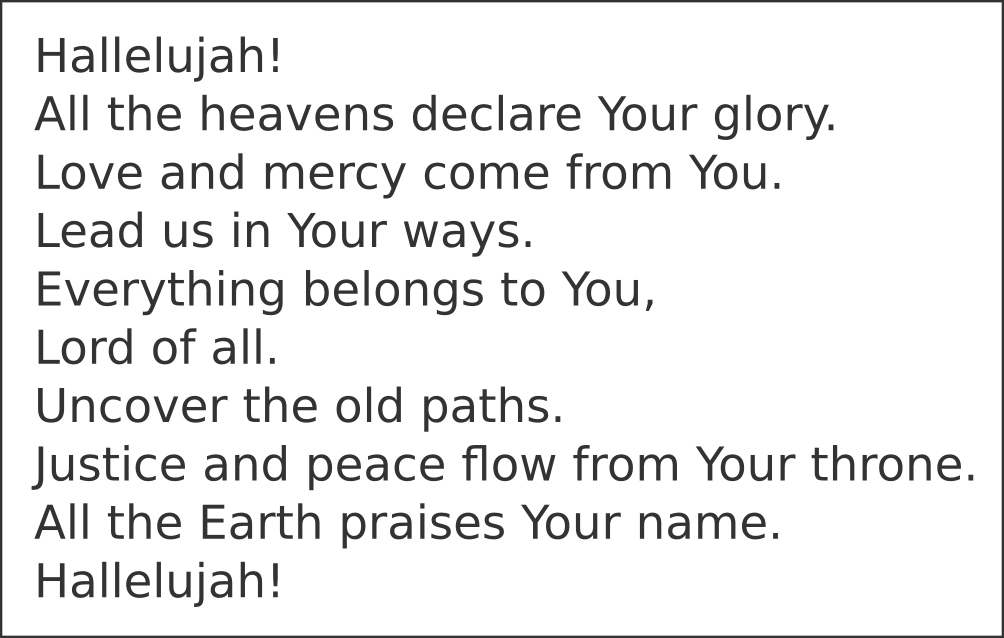
You may find it helpful just to meditate on the words yourself, but here are a few notes relating to some of the connections and understandings that I have explored...
Hallelujah! / Hallelujah!
I chose the word Hallelujah as the acrostic word because of the ways that I
experience it in worship. I like to unpack Hallelujah as "make hallels to Yah"
- that is "make a joyful noise to Yahweh". Then what does the name "Yahweh"
mean? Well, for a start it means something like "I AM" or "I am that I am",
as God described himself to Moses from the burning bush. Some time later,
Moses asks to see the "Glory" of God.
(Exodus 33:18).
God responds by having all His goodness pass before Moses and pronouncing,
proclaiming and explaining His "Name". In so doing He declares His very nature.
As we read in
Exodus 34:6-7:
"Yahweh, Yahweh (the LORD, the LORD), the compassionate and gracious
God, slow to anger, abounding in lovingkindness and faithfulness, showing love
to the thousands generations, forgiving wickedness, rebellion and sin.". Given
that God is just like this, doesn't it make you want to make a joyful noise to
Him? Hallelujah!
All the heavens declare Your glory.
/ All the Earth praises Your name.
Partly inspired by the opening of
Psalm 19
("The heavens declare the glory of God"), these lines have several meanings.
One is that God reveals himself in
all of creation. Another is that the present tense in the second line looks
forward to a time when Jesus Christ will rule and reign, when "every knee
will bow and every tongue confess that Jesus Christ is Lord to the glory of
God the Father". These lines speak of God's revealing himself (His "glory")
and the response of the Earth praising His "name". This can be understood on
a personal level too - God has revealed Himself so what is our response?
The parallelism of "glory" and "name" echoes the connection mentioned in
Exodus 33:18-19,
where Moses asks to see Yahweh's "glory" and Yahweh responds by explaining His
"name". For the second line, see
Psalm 66,
especially verses 1-4.
Love and mercy come from You. / Justice and peace flow from
Your throne.
Further description of God's nature and declaring that He does not just keep
His nature to Himself, but shares it with us. For the second line, see
Psalm 45:6-7,
and its quotation in
Hebrews 1:8-9.
The words "Your throne, O God, is forever and ever..." seem to be addressed
to the Davidic king in the original context of Psalm 45, but are understood
to be speaking of Jesus in Hebrews. In any case the Davidic king (to some
extent) and Jesus minister God's reign to people, which means justice,
righteousness, peace and joy. See also
Psalm 89
for several themes similar to this acrostic.
Lead us in Your ways. / Uncover the
old paths.
Many things can be and are said of ways and paths in God's word. "Uncover the
old paths." is a reference to
Jeremiah 6:16.
Jesus described Himself as the
Way, the Truth and the Life. The early Christians were called followers of the
Way. See also
Psalm 84:5
- "How blessed are those who find their
strength in you, and long to travel the roads that lead to your temple!".
Everything belongs to You, / Lord of all.
Yahweh is sovereign. Interestingly, these two lines are chiastic in structure
themselves, having the form A B C C' B' A', with parallel parts 'Everything' /
'all', 'belongs to' / 'of' and 'You' / 'Lord'. They are also acrostic in that
they spell "El", another name for God. At the very centre of the whole
chiastic acrostic are the words "You, Lord". These words refer to God, remind
us that we are addressing Him and speak of His relationship to us as Lord.
George Chauvet - 2014